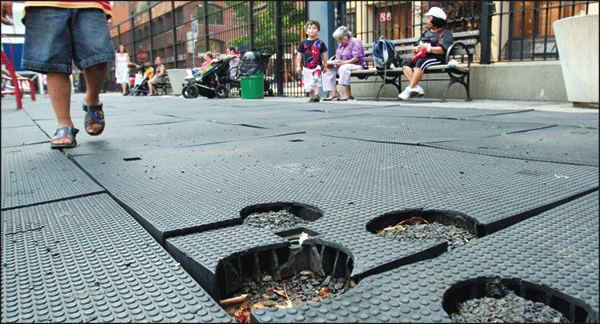By Julie Shapiro
Volunteering is usually a one-way street, with one group of people donating their time and another group receiving the services.
Mashi Blech’s goal is to turn that model on its head.
Blech recently launched a program on the Lower East Side that encourages volunteers to become recipients of services and recipients to become volunteers. It’s called TimeBank, a concept that has gained international followers.
“TimeBank benefits everybody,” Blech said recently from her Midtown office. “It’s not a program for ‘those needy folks.’ The model is built on the premise that we all have needs and we all have something to offer.”
Anyone can join TimeBank. Members receive a credit for each hour they volunteer, and they can spend those credits getting a service they need from another TimeBank member. They trade grocery shopping for piano lessons, childcare for computer repair. And while Blech keeps track of all the hours donated and received, the actual balance of each “account” is not the point.
“It’s not about the credits,” Blech said. “Our mission is for people to give what they can and get what they need.”
This is one bank where members don’t need to worry about overdrawing, and account holders are happy to help each other out, even if they don’t know what they will get in return, Blech said.
The Lower East Side TimeBank, launched in April, is modeled closely on the TimeBank Blech started in Washington Heights several years ago. Both programs, run by the Visiting Nurse Service of New York, partner with local community organizations and offer members discounts at any array of shops and restaurants. Blech decided to target the Lower East Side because of the aging population, along with the large immigrant groups. The neighborhood’s gentrification also puts increasing pressure on longtime residents, she said.
Many of the members approach Blech with a clear need, but they can’t imagine how they would help others. Particularly older women, who may sign up to have someone do heavy lifting or accompany them to a doctor’s appointment, tell Blech that they have nothing to offer. Some do not speak much English and they tell her that since they spent most of their adult lives as housewives, they have no special skills.
But Blech doesn’t buy that for a second. These women are experts at managing households, raising children, cooking and cleaning, Blech said. In return for the services they receive from TimeBank, they can bake for busy families and babysit kids while mothers run errands. Those fluent in Spanish or Mandarin teach language lessons from their homes.
Blech, who has lived in Battery Park City since 1984, has been TimeBanking for 20 years. She got hooked on the model because it’s “an innovative way to offer a safety net for community members,” she said. “It changes the way people think about one another.”
The modern TimeBank started in the 1980s with a grant from the Robert Wood Johnson Foundation that launched five centers across the United States — but Blech thinks an informal version has been around since caveman days. Perhaps one caveman would go out to hunt while another guarded the fire, and they would split the meat upon the caveman’s return, she suggested. More recently, Blech has seen mothers groups run babysitting pools or trade off cooking dinner.
Today, TimeBank has spread worldwide, from the United Kingdom to Chile. The TimeBank in Washington Heights attracted members from 7 years old to 93, each giving and receiving, Blech said.
Language lessons and translations are the most popular request, and in Washington Heights, 38 percent of the members speak only Spanish. People are sometimes hesitant about going outside of their comfort zones, but TimeBank helps them get over their fear.
As Blech said, “We have people exchanging who don’t even speak the same language.”

































